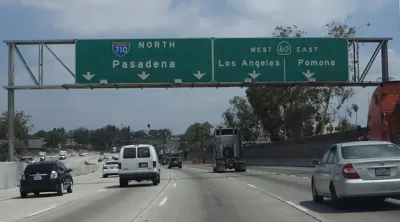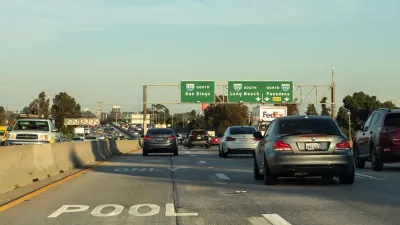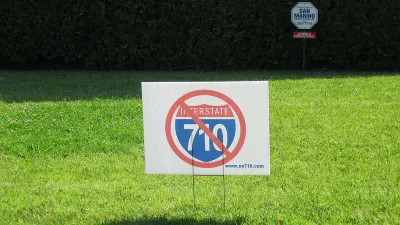The agency's board members spoke out forcefully against air pollution and displacement, but stopped short of completely rejecting the project, looking instead to cleaner vehicles and regulations that mitigate community concerns.

Despite decades of denouncement from community activists and state and federal agencies, the board of the Los Angeles County Metropolitan Transportation Agency denounced, "but did not officially scrap" a project that calls for the widening of the 710 Freeway. As Liam Dillon writes in the Los Angeles Times, "[t[he half-hour debate at the Los Angeles County Metropolitan Transportation Authority’s board meeting highlighted transportation officials’ struggles in addressing the freeway’s vital role in the region’s economy and its environmental harms to the predominantly low-income Latino neighborhoods in Long Beach, Lynwood and Bell Gardens and others nearby." In March, the federal Environmental Protection agency (EPA) told Metro that "the expansion would increase heavy-duty freight travel and probably violate Clean Air Act standards."
In addition to concerns about poor air quality, which local residents already suffer from, the current expansion plan calls for "the possible eviction of more than 100 families and 150 businesses, raising concerns that those displaced would not be able to find alternative places to live given L.A.’s housing affordability crisis." But "[t]he southern portion of the 710 Freeway, which runs about 20 miles from Long Beach to Alhambra, is one of the most critical economic transportation corridors in the country, linking the Ports of Los Angeles and Long Beach with the region’s network of warehouses and roadways that power the nation’s consumer economy."
Proposed mitigations include "a new lane for zero-emission trucks along nearly the entire stretch from the ports through East Los Angeles and upgraded ramps and interchanges" and a clear stand against displacement. Outgoing Metro CEO Phillip Washington said, for the project to move forward, it must require local hiring, and that "[t]here should be zero emissions. There should be no displacements." Opponents of the freeway would rather see the project rejected altogether, "but were pleased that board members were clear that the current proposal wasn’t likely to advance."
FULL STORY: L.A. transportation leaders stop short of pulling the plug on 710 Freeway expansion

Maui's Vacation Rental Debate Turns Ugly
Verbal attacks, misinformation campaigns and fistfights plague a high-stakes debate to convert thousands of vacation rentals into long-term housing.

Planetizen Federal Action Tracker
A weekly monitor of how Trump’s orders and actions are impacting planners and planning in America.

In Urban Planning, AI Prompting Could be the New Design Thinking
Creativity has long been key to great urban design. What if we see AI as our new creative partner?

King County Supportive Housing Program Offers Hope for Unhoused Residents
The county is taking a ‘Housing First’ approach that prioritizes getting people into housing, then offering wraparound supportive services.

Researchers Use AI to Get Clearer Picture of US Housing
Analysts are using artificial intelligence to supercharge their research by allowing them to comb through data faster. Though these AI tools can be error prone, they save time and housing researchers are optimistic about the future.

Making Shared Micromobility More Inclusive
Cities and shared mobility system operators can do more to include people with disabilities in planning and operations, per a new report.
Urban Design for Planners 1: Software Tools
This six-course series explores essential urban design concepts using open source software and equips planners with the tools they need to participate fully in the urban design process.
Planning for Universal Design
Learn the tools for implementing Universal Design in planning regulations.
planning NEXT
Appalachian Highlands Housing Partners
Mpact (founded as Rail~Volution)
City of Camden Redevelopment Agency
City of Astoria
City of Portland
City of Laramie





























